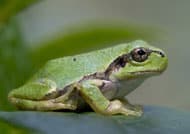Description:
Pine barrens treefrogs are a beautiful green coloration with a deep brown mask that fades to lavender as it extends down the lateral aspect of the frog’s body. The lateral stripe has a vivid, cream or white, border. As adults, pine barrens treefrogs feed on appropriately sized invertebrates. The larval stage feeds on aquatic vegetation and algae. This frog is protected throughout its entire range. It was afforded “endangered” status by the U.S. Fish and Wildlife Service from 1977 to 1983. As with many endangered species, the activities of man have greatly reduced suitable habitat for these frogs. The destruction of wetlands for development has rendered many of the historical breeding pools unsuitable for these delicate anurans. Because they are protected in all the states where they occur, it is illegal to possess these frogs in captivity without special permits.
Habitat:
Pine barrens treefrogs are often found in brushy areas, near hillside seeps or in peat bogs. They appear to use the lowest levels of the brush. Sandhills and pine barrens also appear to be suitable habitat. Adult pine barrens treefrogs are terrestrial for the most part, living near spring-fed pools and other aquatic environs.
Range:
Pine barrens treefrogs are recorded from New Jersey, North and South Carolina, Alabama, and the Florida panhandle, in three disjunct populations.
Scientific Name: Hyla andersonii
Species Group: frog
Family: Hylidae
Size: Adults measure 1¼ to 1¾ inches in total length. Males are slightly larger than females.
Level: intermediate
Weight: N/A
Dangerous: No



